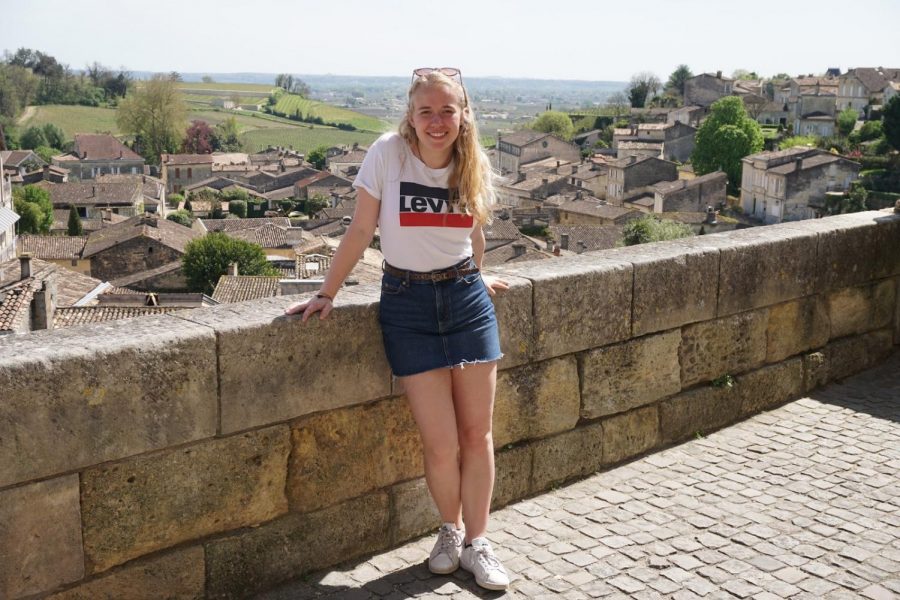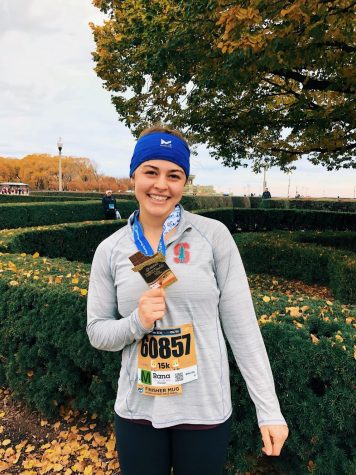Q&A with Lorelei Duelli
February 20, 2019
I got a chance to sit down with senior Lorelei Duelli, who spent her junior year studying abroad in France on an exchange program.
Tell me a little bit about the study abroad program and how you discovered it.
My dad was an exchange student—that’s how he came to the US—and it’s what first got me interested. Around sophomore year, I thought, “Okay, I can’t spend any more time at this school. I really want to get out and explore.” Language, being a passion of mine, got me started on this path as well. Kate Bellino had done an exchange year in Belgium before me, and I learned about the different programs from her. The process was actually very easy.
Did you always know you wanted to study abroad?
I honestly didn’t know it was even an option for me. There are a lot of kids in our grade who do these programs, and traveling to Switzerland regularly, and wanting to be fluent in French were both steps in that direction. Talking to Kate Bellino about her experience solidified my desire to travel abroad.
When you got there, how did you adjust? Were you homesick?
I was surprised at how little I experienced it when I first got there, but as the holidays crept up, it was horrible. I couldn’t go home, my siblings couldn’t visit me. It was a hard adjustment. As much as we want to think that Western Europe is similar to the US, it’s very different. I saw it coming because I had been to Switzerland, but trying to assimilate was difficult.
What was the name of the school and where in France was it?
I spent my first semester at a private Catholic school called Ecole Notre Dame de Pamiers in southern France. I lived in a really small commune surround by farmland. In my second semester, I went to Lycee Garcia Lorca. They called it an Agriculture School, but it was a more specifically focused school of science. That was in the city of Taize right outside of Perpignan.
What did you do with your time outside of school?
I didn’t do a lot of extracurriculars because trying to engage in the culture was enough for me. But when I had time, I would go into the city with my friends, or I would go to the gym.
How was the school system different in France than in the US?
In France, you are with one class of about twenty kids for the whole day, and the teachers rotate classrooms. They like to lecture and take notes. There aren’t very many activities going on. That was difficult to get used to because you would be sitting down for two hours at a time, listening to teachers from 8 in the morning to 5:30 at night.
Did that system help you learn better or did you want to learn in more of a US-education system, with hands-on learning or visuals?
I definitely missed the American school system. I don’t want to say the French school system doesn’t work, because it’s just a different way of learning. Before I went to France, however, I feel like I took what we have here for granted. I didn’t write any essays, and I didn’t have any projects to work on—my homework was just worksheets of what we learned in class. So just listening to a teacher and trying to receive the information was difficult. It is hard to show people how we take it for granted without actually experiencing it.
Making the adjustment academically was a challenge. But how about culturally?
One way I like to describe the difference is with how people greet each other after coming home. In the US, you come home and people say, “How was school?” or “How was your day?”. In France, people say, “What did you eat today?”. Their culture revolves completely around food, it’s very interesting. My host brother was quaking when he saw me eat a peanut butter and jelly sandwich. Besides food, French people are very touchy-touchy, and there are fewer physical boundaries than in the US. When people greet each other, they kiss each other on the cheeks, and there are people tanning on the beach without tops on, but you have to be respectful of the culture and understand that this is what they do. Once you set those cultural differences aside, it is much easier to immerse yourself.
In America, I feel like students are able to develop a relationship with their teachers. I know a lot of kids who feel comfortable talking to their teachers casually, or even about personal matters. Lots of teachers even encourage their students to come forward with issues they may have. Does the American student-teacher dynamic reflect the lighter cultural boundaries, like you said, in France?
No, its not. The teachers are strictly there to teach. There is not a lot of help to get outside of class, and there isn’t really room for relationships. Even in the classrooms themselves, typically you would decorate them with posters, or work that students have done. But in France, they are plain white. It’s serious. You are there for school and that’s it.
Did you meet anyone who changed your experience or impacted your trip?
Yes—a girl named Piper O’Grady became my best friend. She was from Australia on the same exchange program as me. It’s cool to think that you can make a friend from across the world just because of a program like this. She had already been in France for most of her exchange, so she was already used to the culture. She helped guide me through my own experience, and understood everything I was going through. I also met a girl named Elodie at my second school. She was very open with me, and she understood all of the quirky American characteristics that I had. I’m so appreciative of the way she was able to take me in and accept me for who I was, rather than try to change me or make me more French. She was also interested in learning all about my culture as well.
Do you recommend these kinds of exchange programs to other kids?
Yes, of course. I really want to advertise that this is an option. This is not just about school, or just learning a new language. This is about discovering a new culture and exploring it for yourself. If you are open to that, then do it. I think that getting abroad and immersing yourself in another person’s culture is so important. We are so different from the rest of the world, and if you don’t have that experience, you are missing out on so much.







